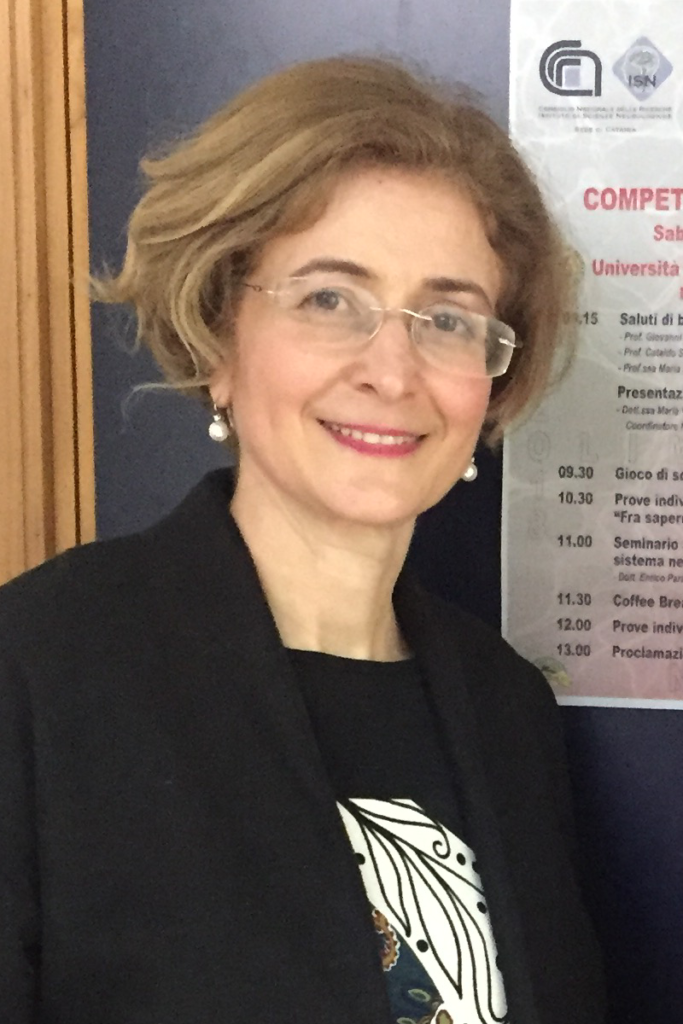Maria Vincenza Catania graduated in Medicine and Surgery and specialized in Neurology at the University of Catania (cum laude). After a five year post-doctoral training at Harvard University/Massachusetts General Hospital, Boston, USA (‘91-‘93) and Heidelberg University, Zentrum für Moleculare Biologie (ZMBH), Germany (’93-‘95), she returned back to Italy as a researcher at CNR. She currently coordinates a research group at the Catania branch of IRIB-CNR and since 2002 has been leading the neurobiology laboratory of the IRCCS Oasi Research Institute IRCCS - Troina.
Principal investigator of several projects granted by National and International funding agencies (Telethon, FRAXA-USA, Lejeune Foundation-Paris, MIUR, Italian Ministry of Health).
Invited speaker in several national and international meetings.
She organized several Neuroscience symposia and meetings, including two Jacques Monod conferences dedicated to the genetic and neurobiological basis of Intellectual Disabilities (http://www.cnrs.fr/insb/cjm/archives/index.html, Roscoff, France).
She obtained her qualification as a full professor of Physiology (D1) and Pharmacology (G1).
Supervisor of undergraduate and Ph.D. students and external member of the College of professors of the Doctorate in Biotechnology of the University of Catania.
Supervisor of foreign students under the Erasmus plus program.
Since 2020 she has been a member of the Board of the Italian Society of Neurosciences for the Nervous System Disorders Sector.
She is involved in various training activities in university courses and scientific outreach and is the national (2017-2018) and regional (2013-today) coordinator of the Neuroscience Olympics, the national phase of the International Brain Bee (IBB): an international competition for students of 13-19 years, on the level of knowledge in the field of neuroscience.
http://www.isn.cnr.it/index.php/olimpiadi-delle-neuroscienze-2017/
http://www.isn.cnr.it/index.php/olimpiadi-delle-neuroscienze-2018/
Her scientific activity is focused on the study of glutamate receptors in the nervous system and their role in the pathogenesis of neurological diseases, namely Amyotrophic Lateral Sclerosis and Neurodevelopmental DIsorders associated with Intellectual Disability and Autism, particularly Fragile X Syndrome.
She authored 69 peer-reviewed articles (H-index 37, Scopus and WOS; 41 Google Scholar) and 12 chapters in Neuroscience textbooks.
2016-2020 “Homer-mGlu5 scaffold as common abnormal mechanism and therapeutic target for Intellectual Disability (ID) and Autism Spectrum Disorders (ASD)” n° WFR PE-2013-02355126, Ricerca Finalizzata e Giovani Ricercatori 2013 – Min. Salute “Estero” PRINCIPAL INVESTIGATOR c/o Oasi Reasearch Institute – IRCCS Troina.
2013-2018 “Activation of serotonin type7 (5HT7) receptors as a novel therapeutic strategy for Fragile X Syndrome“ Progetto Telethon GGP13145 PI L. Ciranna UNICT, resp. Unit, CNR MV Catania, resp. Unit UNIBA M Leopoldo .
Research Area Rare Disease and Neuroscience
Project: Neurobiological Aspects of Intellectual Disabilitiy
Intellectual Disability (ID) is a developmental disorder that affects 2-3% of the population and is characterized by cognitive and adaptative deficits. There is no pharmacological treatment aimed at correcting the altered mechanisms underlying cognitive disorder. Many diseases characterized by ID, often associated with other disorders such as autism and epilepsy, have a genetic cause and are singularly rare. Despite the phenotypic diversity of the different syndromic forms, it is likely that a common set of genes and proteins and their alterations converge in determining the common ID symptom. Therefore, it is essential to identify common molecular mechanisms and biochemical pathways in order to develop innovative therapeutic strategies. Our research team has identified some biochemical mechanisms potentially responsible for dysfunctions of synaptic transmission in the mouse model of Fragile X chromosome syndrome (FXS), the most common form of hereditary ID, frequently associated with autism and epilepsy. The aim of the project is to correct synaptic dysfunctions in FXS and to extend the study of the mechanisms identified in FXS to other neurodevelopmental disorders associated with DI and autism, with the ultimate goal of understanding the molecular mechanisms underlying ID and the associated disorders (autism and epilepsy) and to identify new therapies.



